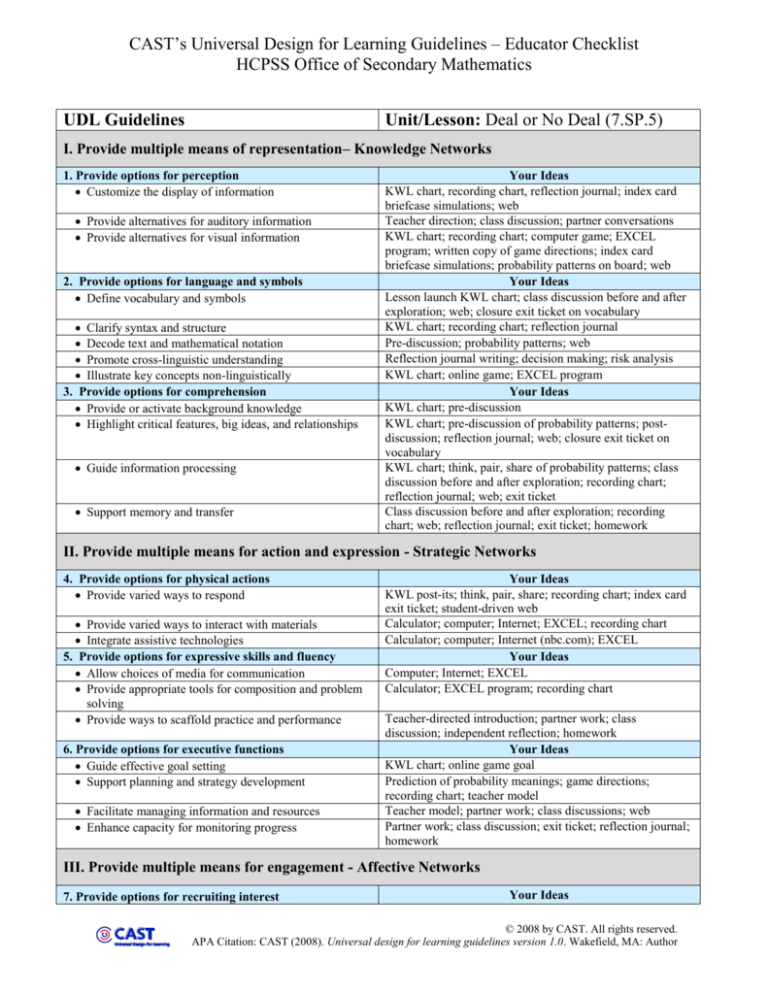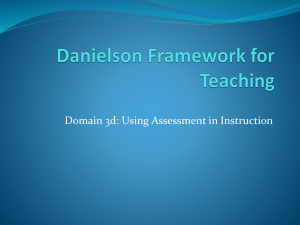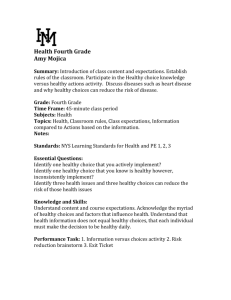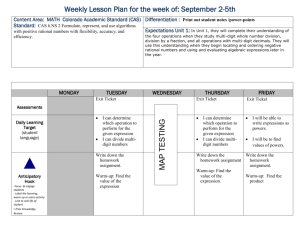
CAST’s Universal Design for Learning Guidelines – Educator Checklist
HCPSS Office of Secondary Mathematics
Unit/Lesson: Deal or No Deal (7.SP.5)
UDL Guidelines
I. Provide multiple means of representation– Knowledge Networks
1. Provide options for perception
Customize the display of information
Provide alternatives for auditory information
Provide alternatives for visual information
2. Provide options for language and symbols
Define vocabulary and symbols
Clarify syntax and structure
Decode text and mathematical notation
Promote cross-linguistic understanding
Illustrate key concepts non-linguistically
3. Provide options for comprehension
Provide or activate background knowledge
Highlight critical features, big ideas, and relationships
Guide information processing
Support memory and transfer
Your Ideas
KWL chart, recording chart, reflection journal; index card
briefcase simulations; web
Teacher direction; class discussion; partner conversations
KWL chart; recording chart; computer game; EXCEL
program; written copy of game directions; index card
briefcase simulations; probability patterns on board; web
Your Ideas
Lesson launch KWL chart; class discussion before and after
exploration; web; closure exit ticket on vocabulary
KWL chart; recording chart; reflection journal
Pre-discussion; probability patterns; web
Reflection journal writing; decision making; risk analysis
KWL chart; online game; EXCEL program
Your Ideas
KWL chart; pre-discussion
KWL chart; pre-discussion of probability patterns; postdiscussion; reflection journal; web; closure exit ticket on
vocabulary
KWL chart; think, pair, share of probability patterns; class
discussion before and after exploration; recording chart;
reflection journal; web; exit ticket
Class discussion before and after exploration; recording
chart; web; reflection journal; exit ticket; homework
II. Provide multiple means for action and expression - Strategic Networks
4. Provide options for physical actions
Provide varied ways to respond
Provide varied ways to interact with materials
Integrate assistive technologies
5. Provide options for expressive skills and fluency
Allow choices of media for communication
Provide appropriate tools for composition and problem
solving
Provide ways to scaffold practice and performance
6. Provide options for executive functions
Guide effective goal setting
Support planning and strategy development
Facilitate managing information and resources
Enhance capacity for monitoring progress
Your Ideas
KWL post-its; think, pair, share; recording chart; index card
exit ticket; student-driven web
Calculator; computer; Internet; EXCEL; recording chart
Calculator; computer; Internet (nbc.com); EXCEL
Your Ideas
Computer; Internet; EXCEL
Calculator; EXCEL program; recording chart
Teacher-directed introduction; partner work; class
discussion; independent reflection; homework
Your Ideas
KWL chart; online game goal
Prediction of probability meanings; game directions;
recording chart; teacher model
Teacher model; partner work; class discussions; web
Partner work; class discussion; exit ticket; reflection journal;
homework
III. Provide multiple means for engagement - Affective Networks
7. Provide options for recruiting interest
Your Ideas
© 2008 by CAST. All rights reserved.
APA Citation: CAST (2008). Universal design for learning guidelines version 1.0. Wakefield, MA: Author
CAST’s Universal Design for Learning Guidelines – Educator Checklist
HCPSS Office of Secondary Mathematics
Increase individual choice and autonomy
Enhance relevance, value, and authenticity
Reduce threats and distractions
8. Provide options for sustaining effort and persistence
Heighten salience of goals and objectives
Vary levels of challenge and support
Foster collaboration and communication
Increase mastery-oriented feedback
9. Provide options for self-regulation
Guide personal goal-setting and expectations
Scaffold coping skills and strategies
Develop self-assessment and reflection
Online game choices in choosing briefcases and taking the
deal; KWL chart; exit ticket; homework questions
Simulation of actual game show; decision making and risk
analysis
Partner work; independent reflection
Your Ideas
Partner work; class discussion; reflection journal; exit ticket
Think, pair, share; partner work; class discussion
Partner work; class discussion; exit ticket; homework
Your Ideas
Online game goals and calculated probabilities
Reflection journal; exit ticket
© 2008 by CAST. All rights reserved.
APA Citation: CAST (2008). Universal design for learning guidelines version 1.0. Wakefield, MA: Author






